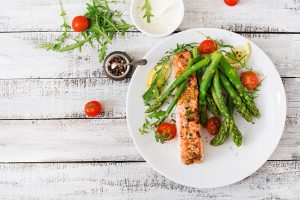
Coenzyme Q10, or CoQ10, is an essential nutrient found in virtually every cell in your body. But with age, the amount you can produce diminishes. Many turn to supplements to fill the void, but can you get CoQ10 from food?
Just why are people concerned about CoQ10? It’s pretty simple: it plays an essential role in energy production, healthy DNA replication, and is a powerful antioxidant that may help protect against free radicals.
In short, it helps you stay healthy and energized.
Food, of course, provides energy. Calories are energy measurements and fuel body function. They are also not created equally. Nutrient-dense foods provide “good” calories, while empty calories in processed foods are “bad.”
So, you can eat your way to more energy by eating better quality food. In some of those foods, you will also find some very important CoQ10.
Oily fish like salmon, tuna, mackerel, and sardines are good sources of CoQ10. So are organ meats, eggs, nuts, and whole grains.
There is a catch, however. Age can influence nutrient absorption levels, so you might not always be getting all of what you eat. Other factors can negatively influence CoQ10 absorption, like taking cholesterol-lowering statin medication.
Eating quality foods is always the best way to stay energized and get all the nutrients you need. It has a far greater reach than just hitting individual nutrient targets. It actually allows you to feel the benefit of those targets – better health, higher energy, and a lower risk for a host of chronic illnesses.
Supplementing with COQ10 can be a good idea for some, and dosage is ultimately determined by age, healthy profile, and any existing conditions or treatments. But remember that supplements are not substitutes for a nutrient-rich diet.